What We do
Nehemiah Construction Ministries U.K. is a registered UK charity (1129883) and a faith-based company limited by guarantee, which has been operating since 2009. Our mission was by our drilling operations, to provide clean water into local communities – and so using these opportunities to share the love of Christ. We operate mainly in the Turkana and Pokot region of northwest Kenya where the drilling rigs and support vehicles are located – and welcome the opportunities to work alongside and in partnership with similar-minded other organisations.
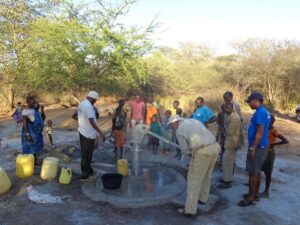
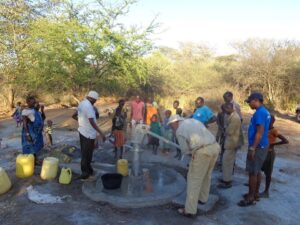
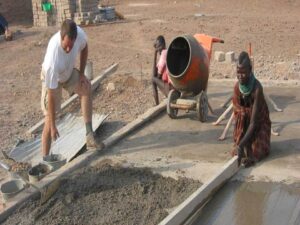
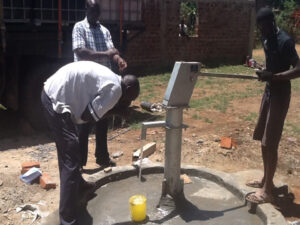
How it Works
A beginner's guide to drilling operations.
Nehemiah Construction Ministries U.K. through its experience and local partners is more than happy to assist with the securing of the necessary paperwork and permissions required by the authorities in Kenya before commencing drilling. These are
- The Geological Survey, which is required to determine whether water is present, at what depth and very importantly what the formation – soil, sand, gravel, rock strata – is. (Whilst essential before drilling these reports are never a guarantee of quantity or quality of water)
- The Drilling Permit Issued by Water Resource Management Authority which gives permission to drill and extract water.
- NEMA permit is issued by the National Environmental Management Authority after an environmental impact assessment report and permit.
Once all the paperwork is in place, drilling can commence. The rig and equipment are operated by local crew consisting of a driller, two assistants, a mechanic and a drilling supervisor. To keep costs to a minimum, the crew are hired on a hole-by-hole basis. All the crew that are hired are well known to NCM UK and have worked together for a considerable time.
Once a borehole is confirmed supplies are purchased – the necessary food, diesel, drilling polymer, bore hole casings, gravel pack etc loaded on to the rig and drilling support truck. This is all done at our rented compound in West Pokot where the equipment is stored repaired and maintained. There is also a house for visitors to stay in.
On arrival at the site the rig is positioned and levelled at the position determined by the geological survey. Accommodation for the crew is either tents or the hospitality of the locals.
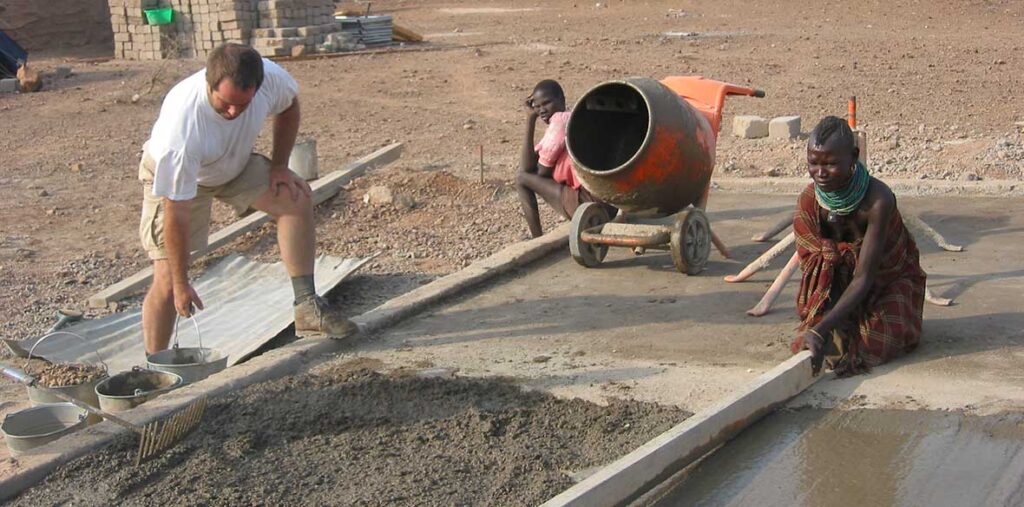
Doing the business: drilling for water
Drilling normally starts with a drag bit to drill through the overburden (the soft stuff). This may be only a few metres deep or could extend many metres with either air or mud drilling to clear the hole until rock reached.
The drag bit and rods are then removed, and the hole is cased with a temporary steel casing to support the hole. The drag bit is then replaced with an air driven ‘down the hole’ hammer bit to drill through the rock to the required depth or until sufficient water is obtained. The hammer is smaller than the drag bit enabling it to pass through the temporary casing.
Once the water level has been hit, if the hole is not stable, a gravel and plastic casing is placed around the hole. Sometimes it is necessary to drill further to develop the water pressure. The air hose flushes the water until it is clean. To stop intruding surface water, the top of the casing is cemented in and the holes are capped with concrete, suitable for an installation of either a hand pump (in rural areas or for electric or solar panel pumps).
A water sample then is sent off for purity testing and the users are instructed in usage and pump maintenance.
Licences and policies matter
Nehemiah Construction Ministries U.K is a registered limited non-profit making company compliant in Kenya (CF/2012/76350) and is a qualified water resource contractor licensed by The Ministry of Water and Irrigation Ref. No. WD/WC/2039 and Certificate No. MTAC – 1270/16.
The Charity, operating in England is subject to the governance of the Charity Commission (England and Wales) and when operating alongside NECOWAS, under the Kenyan legal system
Three work policies provide relevant directions for our operations in this country
There is also detailed guidance for MSN UK volunteers working Kenya – REPUBLIC OF KENYA GUIDELINES FOR CHILD PROTECTION CASE MANAGEMENT AND REFERRAL IN KENYA 2018 and Safeguarding-of-Vulnerable-Persons-Policy.
Who We Are
The Trustees
The Charity is run by a small Board of volunteer Trustees which meets regularly to oversee the governance, legal, financial and all operational aspects of the Charity’s mission and produce an Annual Report in accordance with demands of the Charity Commission and HMRC. A copy of the current Annual Report can be downloaded here

John Harrison
John is Chairman of the trust and was born in Bradford, West Yorkshire, UK. John has been married to Ruth for 50 years. They have a son and a daughter and three grandchildren. He was the Pastor of a number of churches in Wales (Port Talbot), Scotland (Clydebank) and England (Lowestoft, Reading and Peterborough).
During those years, he was also Youth Pastor and Superintendent Minister. He headed up an annual Youth camp for over 10 years and was for many years the “Gang Leader” of the “Good News Gang”, a nationwide Christian children’s club.
In his capacity as founder of this Charity (with Les), he has visited Kenya on numerous occasions participating energetically with his evangelistic and construction work. He officially retired in 2011with his wife and they now live in Somerset. Although he continues the voluntary work with the Trust as Chairman, especially keeping up contact with many supporters of NCM UK and developing the new work, he no longer is able to visit Kenya.

Les Saunders
Les oversees the construction for the trust and was born in St. Leonards on Sea in Sussex. He lived in Kent for a number of years before moving to Peterborough in 1985. He left school at the age of 16 and trained to be a carpenter before joining the Air Force where he served for two years. He learned his many practical skills in his teenage years by working alongside his father. He is a superb carpenter as well as kitchen and bathroom fitter and has worked with John Harrison on many occasions.
Les was brought up in a family with strong Christian values who always had an “overseas missions” outlook. For many years his mother and father have completed short term mission trips to Mumbai in India. His sister has completed many long-term mission projects in Italy and the Philippines.
At the age of 10, Les was given a prophecy which said that one day he would serve God in Africa. That prophecy came true in 1999 when he went to Kenya in East Africa. Since then, he has been to Kenya numerous times always offering himself as a willing volunteer. In 2003 he spent 6 months there with his family. Les is married to Pauline, and they have four children and one grandchild. They attend an Elim City Church in Peterborough. Having spent 2 years living in Kenya Les and Pauline are back in Peterborough, where he runs his own business. Les continues to visit Kenya 3-4 times a year to support the changeover with NECOWAS.
The Board is keen to receive offers of like-minded volunteer assistance – as Trustees, drilling operators and assistants, with specialists to develop the growth of the Charity’s operations in the areas of cultural legalities, finance, communications and those with a concern to practically meet the basic needs of the poor and ‘often-forgotten’ in this region of Africa.

Will Symons
Will was born in London but spent his teenage years growing up in Cheshire. During his working life he has been employed in commercial, charity and public sector organisations in various supervisory and management positions. He worked for the Yorkshire Bank before studying for an MBA, then was employed by the Citizens Advice Bureau before becoming a secondary school Business Manager, a Practice Manager at a City Centre Doctors Practice, running a Facilities Management contract. He is currently engaged in the motor industry and generally oversees the finances of the Charity.
Will has been involved in his local community for many years, he was a school governor for 18 years and is on the boards of the local CAB and another charity in addition to Nehemiah Construction Ministries U.K. He has known Les for over 20 years and John for about 15 years. He has travelled to Kenya with them to see at first hand the needs there. Will has been married to Jane for 23 years and they have two boys, who are also keen to support the development of the charity. The family attend Elim City Church in Peterborough.

Richard Morrison
Richard takes up much of the administrative demands of the charity from his base outside Leicester and has been a Trustee with Nehemiah Construction Ministries U.K since 2017.
Richard was born in Wolverhampton but as a child has also lived in Germany and Egypt. He is married to Fran, and they have with 2 sons and 3 delightful grandchildren. He and Fran are well-travelled with his previous employment: after managing a charity working with disadvantaged young people in Scotland, starting an educational city-wide trust operating in primary and secondary schools – where he met John – after a period developing young leaders through informal small groups in schools across East England. These enterprises followed periods as a church Youth Work Director, a YMCA Programme Director / Hotel Warden and 5 years as an Insurance Company Risk Assessor in 3 locations.
Now, as being ‘actively retired’, he is involved in his local village church and continues to volunteer with the GOOD NEWS for Everyone! in the Midlands.
Where this takes place
Kenya
Kenya is bordered by Ethiopia to the north, Somalia to the northeast, Tanzania to the south, Uganda to the west, and Sudan to the northwest, with the Indian Ocean running along the southeast border. It is named after Mount Kenya, the second highest mountain peak of Africa.
NCM UK work in the counties of Pokot and also in TurkanaT
West Pokot County
West Pokot County is one of the 14 Counties in the Rift Valley region. It is situated in the North Rift along Kenya’s Western boundary with Uganda border. It borders Turkana County to the North and Northeast, Trans Nzoia County to the South, Elgeyo Marakwet County and Baringo County to the Southeast and East respectively. The County lies in an area of approximately 9,169.4 km2 and stretches 132 kilometres from north to south.
The county is characterized by a variety of topographic features. On the northern and northeastern parts are the dry plains, with an altitude of less than 900 m above sea level. On the southeastern part are Cherangani Hills with an altitude of 3,370 m above sea level. Landscapes associated with this range of altitude include spectacular escarpments of more than700 m. The high-altitude areas have high agricultural potential while medium altitude areas lie between 1,500 m and 2,100 m above sea level and receive low rainfall in addition to being predominantly pastoral land. The low altitude areas include Alale, Kacheliba, Kongelai.
Located at an elevation of 2165.01 meters (7103.05 feet) above sea level, West Pokot has a Tropical wet and dry or savanna climate (Classification: Aw). The city’s yearly temperature is 20.47ºC (68.85ºF) and it is -2.03% lower than Kenya’s averages. West Pokot typically receives about 127.7 millimeters (5.03 inches) of precipitation and has 179.62 rainy days (49.21% of the time) annually.
West Pokot County, whose Headquarters is Kapenguria, is mainly inhabited by Pokot community and minority community of Sengwer. The county is known for its rich cultural heritage, agriculture and livestock, within a religious environment mainly of Christian, with a little Muslim, faiths.
Agriculture and livestock sector is the backbone of the county’s economy with more than 80% of the population engaging in farming of cattle, sheep and goats and related activities of the meat industry.
Some of the main crops grown include maize, a staple ingredient grown mainly in West Pokot Sub-County, as well as finger millet, coffee, beans, onions, sweet potatoes, green grams, peas, mangoes, oranges, bananas, potatoes and pyrethrum.
The Turkwel Hydro Power Plant operated by electricity generating company Kengen is situated in West Pokot County. Though the plant produces about 105MW of power which is fed to the national grid, many communities around the power plant and the extensive districts of West Pokot and Turkana do not benefit from this resource
A clinker plant constructed by Simba Cement in Sebit to crush limestone from Sebit Hills of West Pokot County was opened in July 2023. The plant has a capacity to process an estimated 6,000 tonnes of clinker daily (two million tonnes annually) which will be crushed in West Pokot then transported to a grinding plant in Eldoret town.
Turkana
Turkana is an isolated region of Northwest Kenya that covers approximately 70,000 square miles. Located in a valley between two large mountain ranges, the climate is hot, and the land is semi-arid and desert. It has been described as “a horizon-less frying pan of desolation.” With a population of somewhere between 250,000 and 340,000, the Turkana are Kenya’s third-largest tribe, as well as the country’s second-largest group of sheep/cattle farmers, after the Masai. The Turkana are nomadic and move constantly. As rainfall is uneven and unreliable, this can only be accomplished by the tribe fragmenting into small groups, for what there is of pasture-and is insufficient to feed a large number of livestock, as well as people. The land for the most part, is a parched desert plain strewn with rusty sun-baked rocks, coarse sand and small outcrops, and some low and equally barren hills.
Turkana is Kenya’s third-poorest region. With more than half the local economy relying on agriculture and per capita income less than 1/5th of Nairobi’s. Around 55% of Turkana residents live below the poverty line.
In September 2019, Tullow Oil – an American international company – signed an agreement for the development of oil reserve discoveries in the South Lokichar Basin near Lake Turkana. These were discovered in 2012 and are estimated at 560mn bl. Oil is beginning to be transported from the 433-hectare oil production and processing facility to Lamu port in North Kenya via an 820km pipeline and production will likely start in late 2023. Tullow is finalising a water supply agreement to pump water from neighbouring West Pokot County to South Lokichar. Under a petroleum bill in March 2019, central government receive 75% of state oil revenues, local government will get 20% and the communities living where oil is located will take 5%.
Here are some considerations about this development:
“Land disputes will most likely always be there – Turkanans are pastoralists that need community and to graze cattle. Finding common ground between the traditional way of life and the nascent oil industry has proved to be difficult, particularly where the local population has yet to see the much-await revenues from oil.” Patricia Vasquez, an extractive industries expert working in East Africa.
“Most of the pipeline will be laid along community land. We don’t know if any compulsory (land) acquisition will be required- we do not expect many kilometres (of the land on which the pipeline will pass) to be owned by individuals, corporations or even counties.” Mark MacFarlane, Tullow’s executive VP for East Africa.
“At the moment, I could see that this enterprise would affect the population and it’s growth with the necessary development of supporting services in a 50km corridor around the facility and alongside the pipeline – away from where we are operating, although the upgrading of the road from Kitale north has been very beneficial”. Les Saunders, Nehemiah Construction Ministries U.K Operations Manager 2020.
Click here to check out these locations
The Reason For Why We Do This Work
Living Water
Two thousand years ago, a man sat by a water well, asked a woman for a drink and began to talk to her about “Living Water”. He quickly mentioned that if people drank of the water from the nearby well, they would eventually get thirsty again. Then He made a very bold statement “Anyone who drinks the water that I give him will never by thirsty”. That statement is backed up by another one “If anyone is thirsty, let him come to Me and drink”. That man was Jesus Christ, the Son of God, and what He said are two of the most amazing statements in the Bible, Gospel of John Chapter 4, verses 13 and 14 and Gospel of John Chapter 7, verses 37 and 38.
What did He mean? What was He getting at? Did He have His own drilling rig? Did He own a reservoir? Did He have ready access to His own water well?
Jesus was simply stating that everyone needs water for life to exist naturally – but they also needed the ‘Water of Life’ to live fully and forever. He knew then and we know now that you can’t survive for long without water. The stark reality of His statements is that mankind has no hope of eternity without the ‘Living Water’, which is Jesus. We all know that water is satisfying and thirst quenching and we, the Trustees of Nehemiah Construction Ministries U.K., have our own individual experiences of being satisfied in their spirit by Jesus, the Living Water.
Being the Son of GOD, He became the perfect remedy for all humanity’s sin of deciding to ignore the existence of GOD. He completely dealt with this by His self-sacrifice on the Cross. His promise is simply that anyone who believes in and follows Him, will not perish but will have everlasting life.
He satisfies us by coming into our lives, assuring us of God’s forgiveness when we are sorry for and deciding to turn away from our sins and asking GOD for His help in this.
GOD brings His love, joy and peace and giving us the daily assurance of eternal life.
In the last chapter of the Bible, Revelation Chapter 22 and verse 17, the invitation from Jesus still applies today “Come! Whoever is thirsty, let him come and take the free gift of the water of life”.
What Jesus has done for us, motivates us as Trustees to help our fellow human beings of whatever, race, tribe, culture or religion, by providing natural satisfying clean water – freely, for this life and informing them of Jesus Christ, the living water who will satisfy them spiritually for eternity. This is the basis of our values and mission: it directs our behavior and reactions in every situation.
Two thousand years ago, a man sat by a water well, asked a woman for a drink and began to talk to her about “Living Water”. He quickly mentioned that if people drank of the water from the nearby well, they would eventually get thirsty again. Then He made a very bold statement “Anyone who drinks the water that I give him will never by thirsty”. That statement is backed up by another one “If anyone is thirsty, let him come to Me and drink”. That man was Jesus Christ, the Son of God, and what He said are two of the most amazing statements in the Bible, Gospel of John Chapter 4, verses 13 and 14 and Gospel of John Chapter 7, verses 37 and 38.
What did He mean? What was He getting at? Did He have His own drilling rig? Did He own a reservoir? Did He have ready access to His own water well?
Jesus was simply stating that everyone needs water for life to exist naturally – but they also needed the ‘Water of Life’ to live fully and forever. He knew then and we know now that you can’t survive for long without water. The stark reality of His statements is that mankind has no hope of eternity without the ‘Living Water’, which is Jesus. We all know that water is satisfying and thirst quenching and we, the Trustees of Nehemiah Construction Ministries U.K., have our own individual experiences of being satisfied in their spirit by Jesus, the Living Water.
Being the Son of GOD, He became the perfect remedy for all humanity’s sin of deciding to ignore the existence of GOD. He completely dealt with this by His self-sacrifice on the Cross. His promise is simply that anyone who believes in and follows Him, will not perish but will have everlasting life.
He satisfies us by coming into our lives, assuring us of God’s forgiveness when we are sorry for and deciding to turn away from our sins and asking GOD for His help in this.
GOD brings His love, joy and peace and giving us the daily assurance of eternal life.
In the last chapter of the Bible, Revelation Chapter 22 and verse 17, the invitation from Jesus still applies today “Come! Whoever is thirsty, let him come and take the free gift of the water of life”.
What Jesus has done for us, motivates us as Trustees to help our fellow human beings of whatever, race, tribe, culture or religion, by providing natural satisfying clean water – freely, for this life and informing them of Jesus Christ, the living water who will satisfy them spiritually for eternity. This is the basis of our values and mission: it directs our behavior and reactions in every situation.

